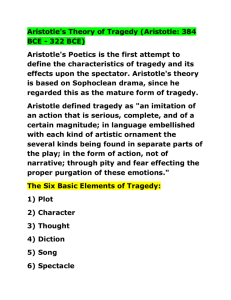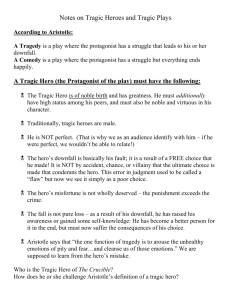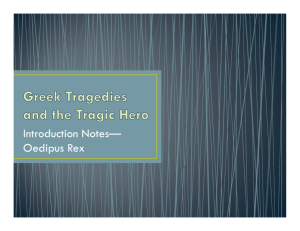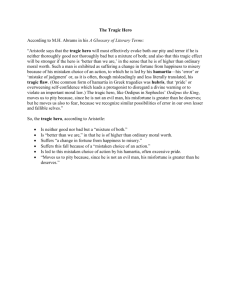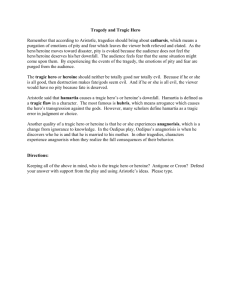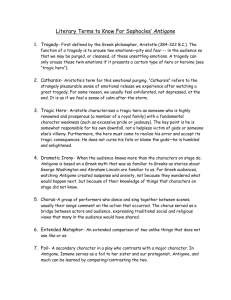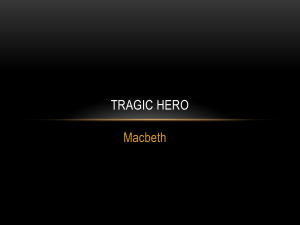Aristotle's Tragedy: Characteristics & Oedipus Rex Analysis
advertisement
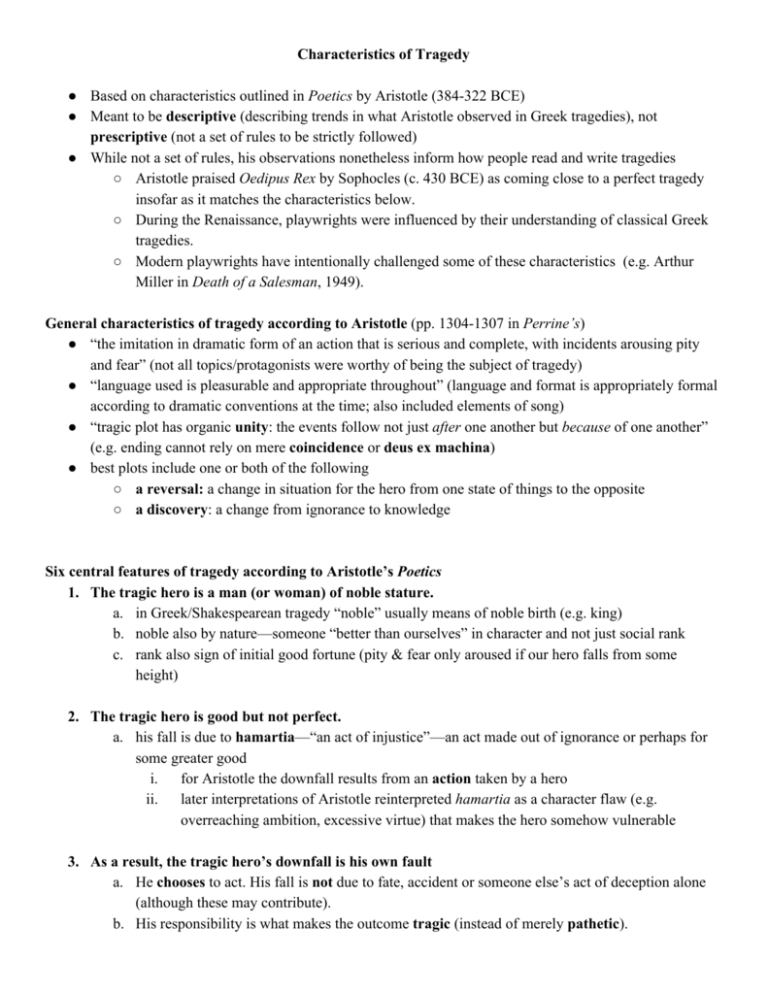
Characteristics of Tragedy ● Based on characteristics outlined in Poetics by Aristotle (384-322 BCE) ● Meant to be descriptive (describing trends in what Aristotle observed in Greek tragedies), not prescriptive (not a set of rules to be strictly followed) ● While not a set of rules, his observations nonetheless inform how people read and write tragedies ○ Aristotle praised Oedipus Rex by Sophocles (c. 430 BCE) as coming close to a perfect tragedy insofar as it matches the characteristics below. ○ During the Renaissance, playwrights were influenced by their understanding of classical Greek tragedies. ○ Modern playwrights have intentionally challenged some of these characteristics (e.g. Arthur Miller in Death of a Salesman, 1949). General characteristics of tragedy according to Aristotle (pp. 1304-1307 in Perrine’s) ● “the imitation in dramatic form of an action that is serious and complete, with incidents arousing pity and fear” (not all topics/protagonists were worthy of being the subject of tragedy) ● “language used is pleasurable and appropriate throughout” (language and format is appropriately formal according to dramatic conventions at the time; also included elements of song) ● “tragic plot has organic unity: the events follow not just after one another but because of one another” (e.g. ending cannot rely on mere coincidence or deus ex machina) ● best plots include one or both of the following ○ a reversal: a change in situation for the hero from one state of things to the opposite ○ a discovery: a change from ignorance to knowledge Six central features of tragedy according to Aristotle’s Poetics 1. The tragic hero is a man (or woman) of noble stature. a. in Greek/Shakespearean tragedy “noble” usually means of noble birth (e.g. king) b. noble also by nature—someone “better than ourselves” in character and not just social rank c. rank also sign of initial good fortune (pity & fear only aroused if our hero falls from some height) 2. The tragic hero is good but not perfect. a. his fall is due to hamartia—“an act of injustice”—an act made out of ignorance or perhaps for some greater good i. for Aristotle the downfall results from an action taken by a hero ii. later interpretations of Aristotle reinterpreted hamartia as a character flaw (e.g. overreaching ambition, excessive virtue) that makes the hero somehow vulnerable 3. As a result, the tragic hero’s downfall is his own fault a. He chooses to act. His fall is not due to fate, accident or someone else’s act of deception alone (although these may contribute). b. His responsibility is what makes the outcome tragic (instead of merely pathetic). 4. Yet the hero’s punishment is not entirely deserved. a. “The punishment [often banishment or death] exceeds the crime.” b. Evokes pity: How could someone so great fall so far? We admire the hero’s character and potential and see his fall as a tragic waste. c. Evokes fear: If that could happen to someone as great as he is, what might happen to us? d. (Some suggest these reactions are better translated as compassion and awe instead of pity and fear because of our sustained admiration for the hero’s nobility of character in the face of his excessive punishment.) 5. The hero’s fall is not a pure loss. a. Even if the hero dies there is “some increase in awareness” beforehand (Aristotle’s discovery mentioned above) i. in terms of plot: some secret may be revealed or mystery explained ii. in terms of character: hero gains self-knowledge or wisdom b. The hero accepts responsibility for his situation, comes to “some sort of reconciliation with the universe,” and sees the outcome as just. 6. The tragedy arouses pity and fear, but ultimately, these emotions are purged. a. This “purging” comes from rough translation of Aristotle’s term catharsis (precise meaning has been much debated) b. audience feels inspired or exhilarated, not depressed at the end; sense of human greatness renewed by hero’s gain in wisdom and willingness to accept responsibility c. “Though the hero may be defeated, he at least has dared greatly, and he gains understanding from his defeat.” Homework: In your notes, explain how the following elements of tragedy appear so far in Oedipus Rex. ● The tragic hero is of noble stature. ● He is good but not perfect. (Consider Oedipus’s strengths and weaknesses. Hamartia?) ● His downfall is his own fault. ● Identify the reversal and the discovery. (Hint: Contrast the end of Scene 3 with the end of Scene 4.)

